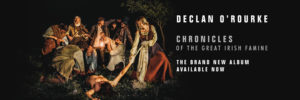 On Sunday we went to see the last British date for Declan O’Rourke‘s tour performing work from his new album Chronicles of the Great Irish Famine. It was a searing experience, rather like my visit to the Dunbrody Famine Ship, which inspired my first collection, Wherever We Live Now, and I hesitated to buy the album, because I was, frankly, in bits by the end, (but I have, since), because he included a lot of intensive research into the background, incidentally filling in some gaps in my own family history – offering some understanding of why my father’s family dropped the ‘O’ in front of their name, (they were required to do so, in order to access the soup kitchens set up by Protestant churches), where the Quaker connection with my great-great-great-grandmother Hanora Foley (who, astonishingly, lived from 1825 to 1938) came from, (Quaker soup kitchens made no such requirement, which would have impressed that fiercely recusant branch of the family) and the origins of the Yellow Road in Waterford, where some of my family lived. Roads were built to provide work for starving people, but in order not to disrupt the market economy they were often ‘roads to nowhere’. The one in Waterford takes a long loop outside the town as it then was, and eventually a fertiliser plant was built there, processing seaweed and guano.
On Sunday we went to see the last British date for Declan O’Rourke‘s tour performing work from his new album Chronicles of the Great Irish Famine. It was a searing experience, rather like my visit to the Dunbrody Famine Ship, which inspired my first collection, Wherever We Live Now, and I hesitated to buy the album, because I was, frankly, in bits by the end, (but I have, since), because he included a lot of intensive research into the background, incidentally filling in some gaps in my own family history – offering some understanding of why my father’s family dropped the ‘O’ in front of their name, (they were required to do so, in order to access the soup kitchens set up by Protestant churches), where the Quaker connection with my great-great-great-grandmother Hanora Foley (who, astonishingly, lived from 1825 to 1938) came from, (Quaker soup kitchens made no such requirement, which would have impressed that fiercely recusant branch of the family) and the origins of the Yellow Road in Waterford, where some of my family lived. Roads were built to provide work for starving people, but in order not to disrupt the market economy they were often ‘roads to nowhere’. The one in Waterford takes a long loop outside the town as it then was, and eventually a fertiliser plant was built there, processing seaweed and guano.
Some of the story was not news to me; the population of Ireland halved (from 8 million to 4 in three years) as a result of the famine, not simply because of starvation and disease, but because of emigration, but it was news that it has never recovered, standing at only 5 million today. The needless cruelty of the workhouse system imposed after the Catholic Emancipation Act, or the forced shipping of young girls to Australia to redress the gender imbalance caused by transportation was new to me. But the most surprising thing was that this history was not widely taught or discussed until the 1990s. Parallels with the records of the Highland Clearances did not escape me!
Reclaiming history may seem like a way to nourish old grudges, but what Declan O’Rourke takes from it is a memory of the resilience of the human spirit, and instances of bravery and tenderness in hard times that should strengthen us against the hard times to come. We need those memories, though they grieve us.
Here is the poem I wrote about my experience at the Dunbrody:
Visiting the Dunbrody Famine Ship
Grief bubbles like rosin out of the pine
they built these stacked bunks from –
one to a family, and bring your own bedding,
each adult’s life packed into no more
than ten cubic feet, says the ticket, including
utensils for eating and drinking.Bad enough in fine weather, queueing to cook
in their cold half hour on deck, but in storms
battened under hatches, chewing raw oatmeal and biscuit,
sweating, vomiting, pissing in the dark,
and the smell of loss and fear. The actors recall
a good captain, five deaths only the whole trip.It’s the lists that really hurt. The database
remembers everyone, keeps them safe by name,
and age and occupation, by ship, and by landfall.
I look for my Foleys, Richard and two daughters,
my grandmother’s family, left Waterford
in 1873, and lost at sea, still lost.It’s the way they tell you, as if they know
it’s you, crying in the dark for your mammy,
and the sweet taste of new milk, and sunlight,
and just to be still. They know those names mend a link
in the chain that leads us back to our dead,
and makes us whole, wherever we live now.
Leave a Reply